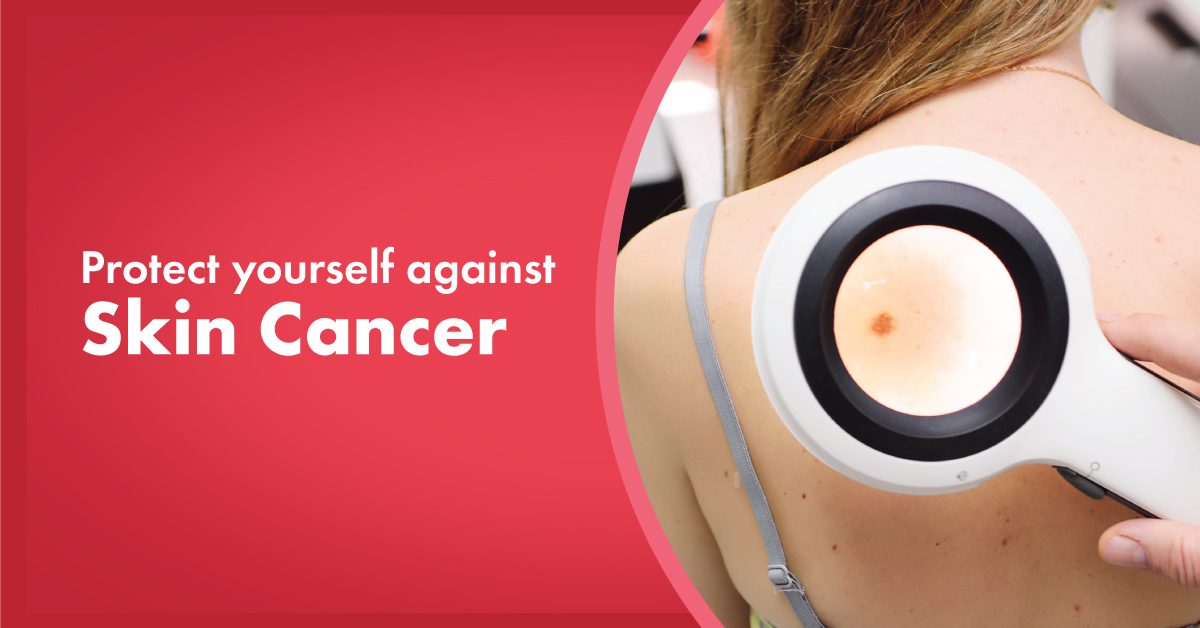Protect yourself Against Skin Cancer

Skin cancer may manifest in abnormal growth of skin cells in areas that gain exposure to the sun. Yet, it is not uncommon to observe them in areas that are otherwise hidden from sun exposure. Depending on the type of cells involved in the formation of skin cancer, three broad categories may emerge.
The three prominent types of skin cancer are basal cell carcinoma, melanoma, and squamous cell carcinoma. To reduce the incidence of contracting skin cancer, exposure to ultraviolet radiation emitting from the sun should be limited. Early diagnosis is key to controlling the further spread of cancer and achieving successful results with treatment.
Skin Cancer Causes
Overexposure to sunlight, particularly when you have sunburn and blisters, is the primary cause of skin cancer. Your skin’s DNA is harmed by the sun’s UV rays, which leads to the formation of aberrant cells. These aberrant cells proliferate quickly and incoherently, aggregating into a mass of cancer cells.
Protection Against Skin Cancer
There are many ways to lower the risk associated with skin cancer. There are many ways to protect yourself against skin cancer including:
- Avoid splurging on tanning sessions through sun lamps or tanning beds.
- Avoid the sun during peak hours, spanning from 10 in the morning to 4 in the evening. Either stay indoors during this time or choose a shaded space to move around.
- Make generous use of sun protection skincare with SPF 30 or higher. Apply such products at least 15 to 30 minutes before exposing your skin to the sun and regularly re-apply the product during the day if you continue to stay exposed to sunlight.
- Wear hats, scarves, and tightly woven fabrics when you are outside, which can protect your skin from exposure to direct sunlight.
- Invest in sunglasses that offer UVA and UVB protection.
Always stay wary of any changes to your skin, such as the formation of any new spots or growth. Inspect your body periodically and assess any changes you observe to be brought to medical attention.
Skin Cancer Symptoms
The onset of skin cancer may not show the same symptoms for everyone. In each case, symptoms can vary from person to person, and it is possible that one may observe only one or a few of the symptoms that are classically associated with skin cancer. Thus, it is vital to stay aware of all of them and report anything unusual. Some of the peculiar symptoms of skin cancer may include the following:
- Lesions: Formation of a new mole, bump, scaly patch, dark spots, or any unusual growth on the skin that does not go away.
- Asymmetrical moles: Differences in the shape of the two halves of a mole or lesion.
- Uneven borders: Ragged lesions with unusual borders
- Evolution: Changes in the color, shape, and size of the lesion or mole
It is vital to note any such changes to an existing or new lesion or mole on your skin, which may help in the early detection of skin cancer.
Skin Cancer Treatment at Regency
Along with providing comprehensive and the best health care services in UP, we have dedicated specialists helping you combat the increasing impact of cancer. Read about our Cancer Care specialty today!
At Regency Hospital Cancer and Gastro Care Tower – 2, you will receive a customized recommendation for skin cancer treatment, depending on the type and stage of your skin condition from our experts Dr. Vinod Kumar Mudgal, Dr.Vikas Talreja, and Dr. Ashish Raj Kulshrestha. Consequently, you may be treated with an individual or combination of treatment options, including chemotherapy, radiation, immunotherapy, excisional surgery, and more.

 Call-an-Ambulance
Call-an-Ambulance



